- NEW: Flare-up of violence in Donetsk leaves 3 dead, mayor's office says
- NEW: U.S. Vice-President Joe Biden, Ukrainian President Peter Poroshenko speak
- All 227 trucks sent over the border are now back in Russia, OSCE says
- German Chancellor Angela Merkel says she cannot rule out further sanctions
Kiev, Ukraine (CNN) -- All the trucks sent over the border by Russia on a humanitarian mission without Ukraine's authorization have now returned to Russia, international monitors said Saturday.
In total, 227 vehicles were sent into eastern Ukraine on Friday, according to the Organization for Security and Co-operation in Europe, which has an observer mission at the checkpoint the convoy went through.
By Saturday afternoon, they had all returned to Russia after delivering aid to the city of Luhansk, a stronghold for the pro-Russia rebels which has been caught up in conflict.
Russia said the vehicles were on an essential humanitarian mission, but international powers condemned it as a violation of Ukraine's sovereignty.
A senior Ukrainian official characterized the convoy as a "direct invasion" of his nation by its mighty neighbor.

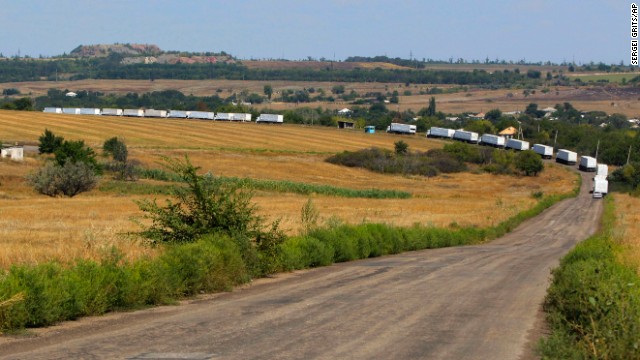 The first trucks of a Russian aid convoy roll on the main road to Luhansk in eastern Ukraine on Friday, August 22. The head of Ukraine's security service called the convoy a "direct invasion" under the guise of humanitarian aid since it entered the country without Red Cross monitors. Ukrainian government forces have been battling pro-Russian rebels near Ukraine's eastern border with Russia. The fighting has left more than 2,000 people dead since mid-April, according to estimates from U.N. officials.
The first trucks of a Russian aid convoy roll on the main road to Luhansk in eastern Ukraine on Friday, August 22. The head of Ukraine's security service called the convoy a "direct invasion" under the guise of humanitarian aid since it entered the country without Red Cross monitors. Ukrainian government forces have been battling pro-Russian rebels near Ukraine's eastern border with Russia. The fighting has left more than 2,000 people dead since mid-April, according to estimates from U.N. officials. 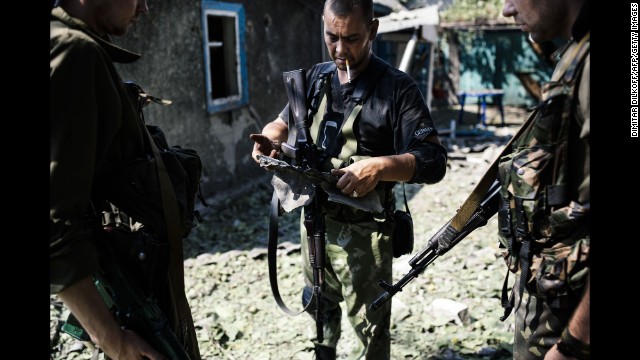 A pro-Russian rebel holds shrapnel from a rocket after shelling in Donetsk, Ukraine, on August 22.
A pro-Russian rebel holds shrapnel from a rocket after shelling in Donetsk, Ukraine, on August 22. 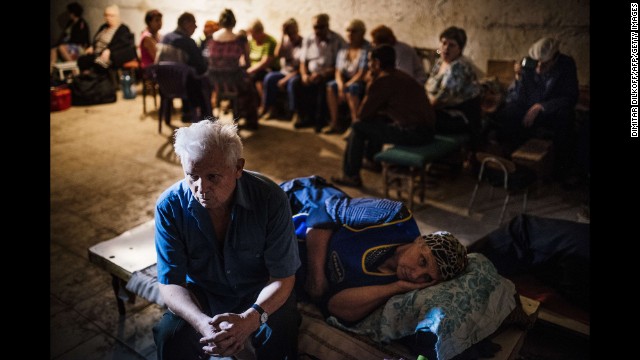 Residents sit in a makeshift bomb shelter during a shelling in Makiyivka, Ukraine, on Wednesday, August 20.
Residents sit in a makeshift bomb shelter during a shelling in Makiyivka, Ukraine, on Wednesday, August 20.  Dogs play together as a Russian convoy carrying aid supplies stops at a border control point with Ukraine, in the Russian town of Donetsk, in the Rostov-on-Don region on August 20.
Dogs play together as a Russian convoy carrying aid supplies stops at a border control point with Ukraine, in the Russian town of Donetsk, in the Rostov-on-Don region on August 20. 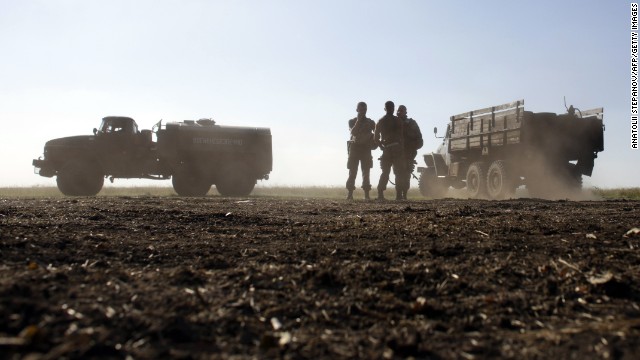 Ukrainian forces take their position not far from Luhansk, Ukraine, on August 20. Ukrainian troops made a significant push into rebel-held territory in eastern Ukraine, claiming control over a large part of Luhansk and encircling the largest rebel-held city, Donetsk, in fighting that has left at least 43 dead.
Ukrainian forces take their position not far from Luhansk, Ukraine, on August 20. Ukrainian troops made a significant push into rebel-held territory in eastern Ukraine, claiming control over a large part of Luhansk and encircling the largest rebel-held city, Donetsk, in fighting that has left at least 43 dead. 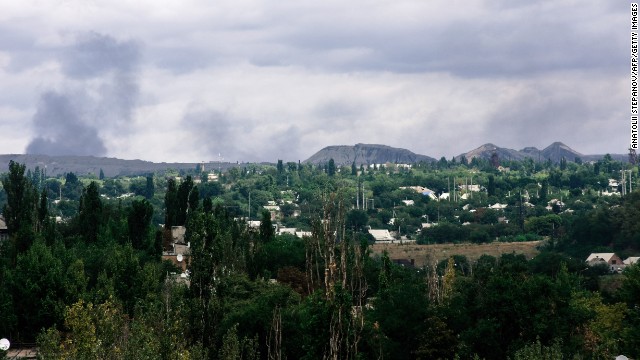 Clouds of smoke are on the horizon as Ukrainian forces and pro-Russian rebels clash in Yasynuvata, a suburb of Donetsk, Ukraine, on Tuesday, August 19.
Clouds of smoke are on the horizon as Ukrainian forces and pro-Russian rebels clash in Yasynuvata, a suburb of Donetsk, Ukraine, on Tuesday, August 19. 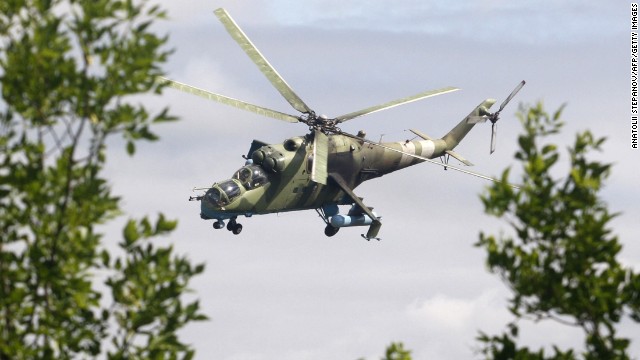 An Ukrainian helicopter flies near Kramatorsk, Ukraine, on August 19.
An Ukrainian helicopter flies near Kramatorsk, Ukraine, on August 19. 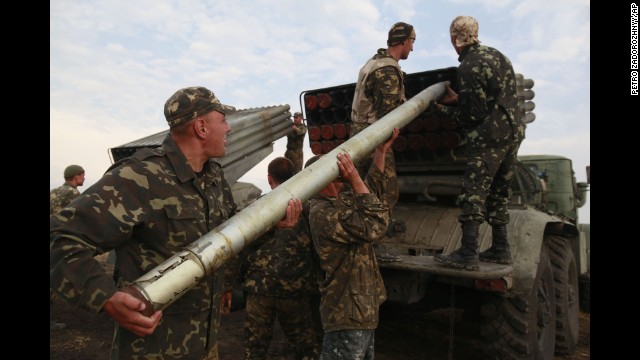 Ukrainian soldiers load a missile during fighting with pro-Russian rebels Monday, August 18, near Luhansk, Ukraine.
Ukrainian soldiers load a missile during fighting with pro-Russian rebels Monday, August 18, near Luhansk, Ukraine. 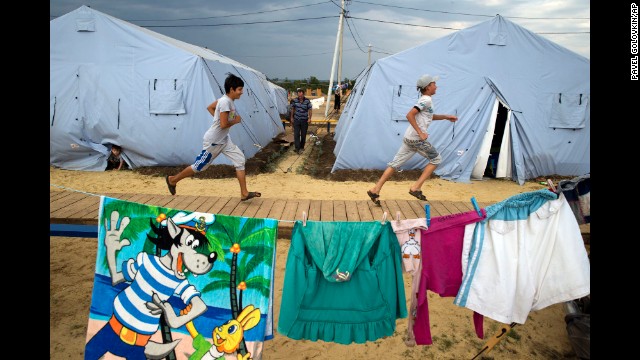 Boys play at a refugee camp, set up by the Russian Emergencies Ministry, near the Russian-Ukrainian border on August 18.
Boys play at a refugee camp, set up by the Russian Emergencies Ministry, near the Russian-Ukrainian border on August 18. 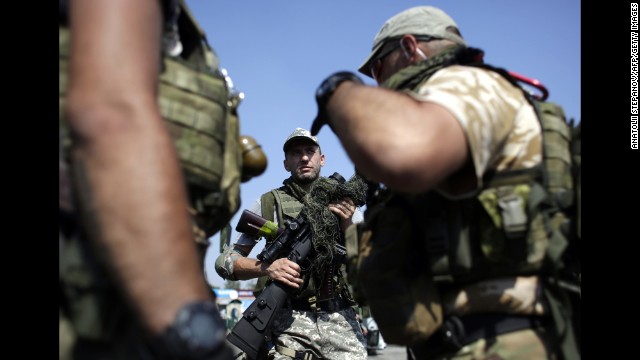 Ukrainian soldiers carry weapons at a checkpoint near Debaltseve, Ukraine, on Saturday, August 16.
Ukrainian soldiers carry weapons at a checkpoint near Debaltseve, Ukraine, on Saturday, August 16. 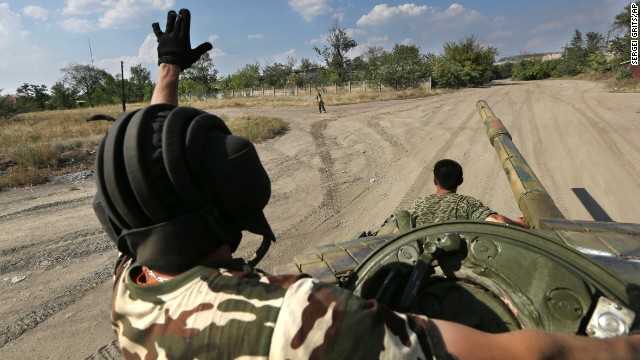 Pro-Russian rebels greet each other as they pass near Krasnodon, Ukraine, on August 16.
Pro-Russian rebels greet each other as they pass near Krasnodon, Ukraine, on August 16. 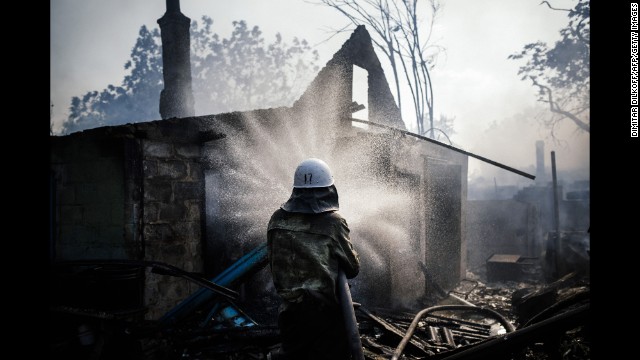 A fireman tries to extinguish a fire after shelling in Donetsk on August 16.
A fireman tries to extinguish a fire after shelling in Donetsk on August 16. 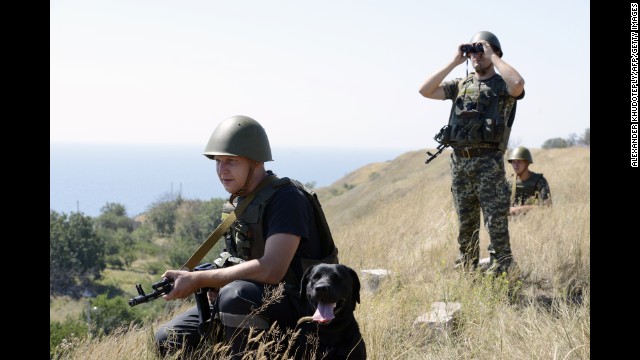 Ukrainian border guards patrol near Novoazovsk, Ukraine, on Friday, August 15.
Ukrainian border guards patrol near Novoazovsk, Ukraine, on Friday, August 15. 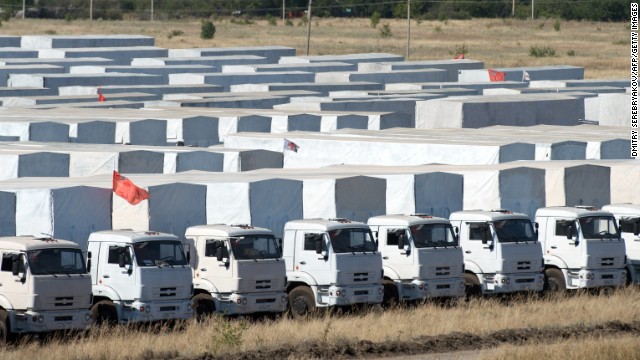 Trucks of a Russian humanitarian convoy are parked in a field outside the town of Kamensk-Shakhtinsky, in the Rostov region of Russia about 20 miles from the Ukraine border, on August 15. Ukrainian officials were preparing to inspect the convoy, which was bound for the conflict-torn east.
Trucks of a Russian humanitarian convoy are parked in a field outside the town of Kamensk-Shakhtinsky, in the Rostov region of Russia about 20 miles from the Ukraine border, on August 15. Ukrainian officials were preparing to inspect the convoy, which was bound for the conflict-torn east. 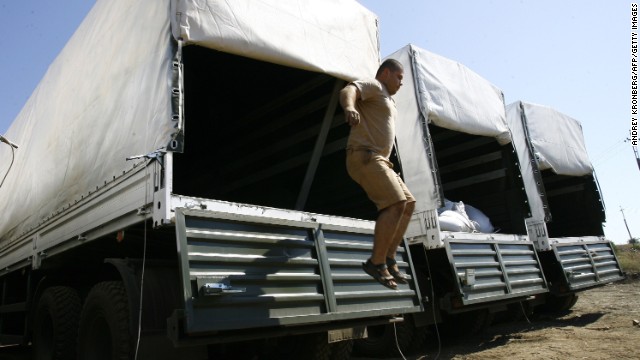 A truck driver from the convoy jumps out of a trailer on August 15. The Ukrainian government had expressed fears that the convoy was a large-scale effort to smuggle supplies or troops to pro-Russian rebels.
A truck driver from the convoy jumps out of a trailer on August 15. The Ukrainian government had expressed fears that the convoy was a large-scale effort to smuggle supplies or troops to pro-Russian rebels.  A tank belonging to pro-Russian rebels moves along a street in Donetsk on August 15.
A tank belonging to pro-Russian rebels moves along a street in Donetsk on August 15.  A Ukrainian soldier walks past a line of self-propelled guns as a column of military vehicles prepares to head to the front line near Illovaisk, Ukraine, on Thursday, August 14.
A Ukrainian soldier walks past a line of self-propelled guns as a column of military vehicles prepares to head to the front line near Illovaisk, Ukraine, on Thursday, August 14.  A Ukrainian soldier prepares a mortar at a position near Illovaisk on August 14.
A Ukrainian soldier prepares a mortar at a position near Illovaisk on August 14. 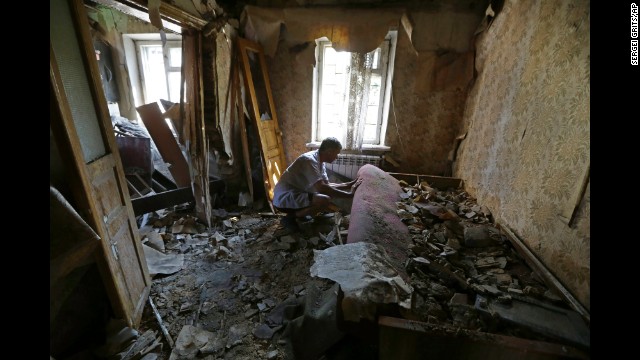 A man inspects damage at his house after a shelling in Donetsk on August 14.
A man inspects damage at his house after a shelling in Donetsk on August 14. 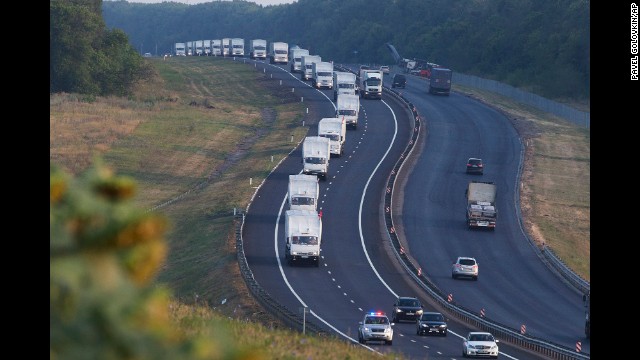 A convoy of trucks, which Moscow said was carrying relief goods for war-weary civilians, moves from Voronezh, Russia, toward Rostov-on-Don, Russia, on August 14.
A convoy of trucks, which Moscow said was carrying relief goods for war-weary civilians, moves from Voronezh, Russia, toward Rostov-on-Don, Russia, on August 14. 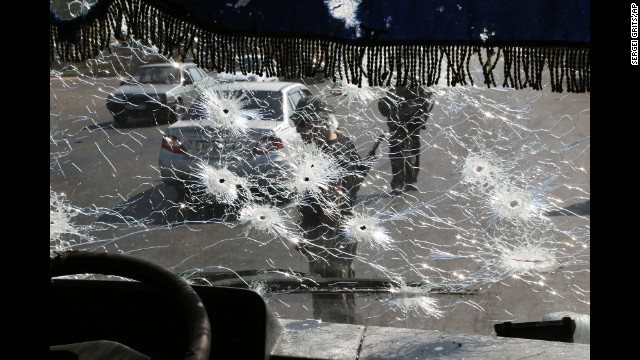 Pro-Russian rebels on the outskirts of Donetsk stand at a checkpoint near a bullet-riddled bus on Wednesday, August 13.
Pro-Russian rebels on the outskirts of Donetsk stand at a checkpoint near a bullet-riddled bus on Wednesday, August 13. 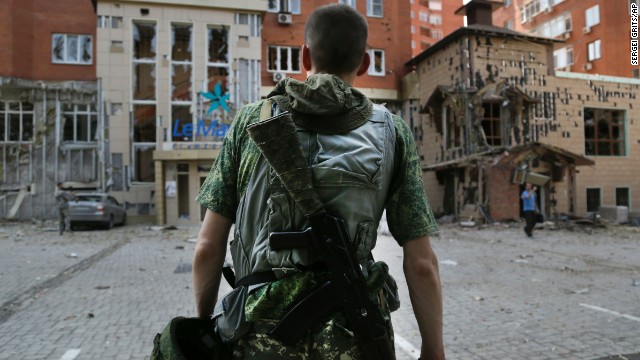 A pro-Russian rebel inspects damage after shelling in Donetsk on Thursday, August 7.
A pro-Russian rebel inspects damage after shelling in Donetsk on Thursday, August 7. 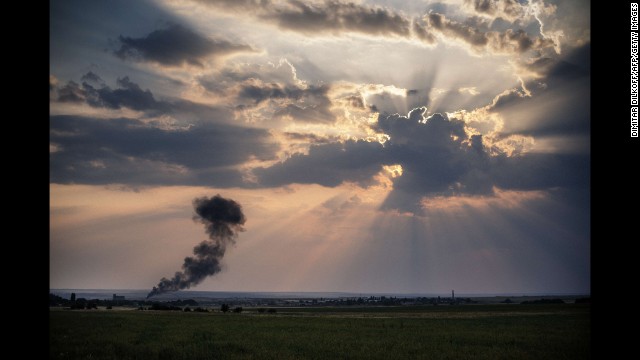 Smoke billows from a Ukrainian fighter jet crash near the village of Zhdanivka, Ukraine, on August 7.
Smoke billows from a Ukrainian fighter jet crash near the village of Zhdanivka, Ukraine, on August 7. 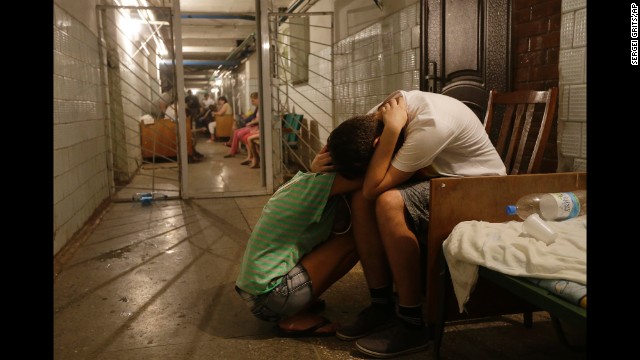 Residents of eastern Ukraine cry in a hospital basement being used as a bomb shelter August 7 in Donetsk.
Residents of eastern Ukraine cry in a hospital basement being used as a bomb shelter August 7 in Donetsk. 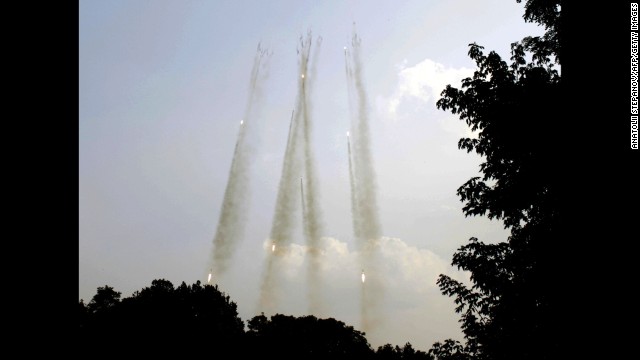 Ordnance from a Ukrainian rocket launcher shoots toward a pro-Russian militant position in the Donetsk region on August 7.
Ordnance from a Ukrainian rocket launcher shoots toward a pro-Russian militant position in the Donetsk region on August 7. 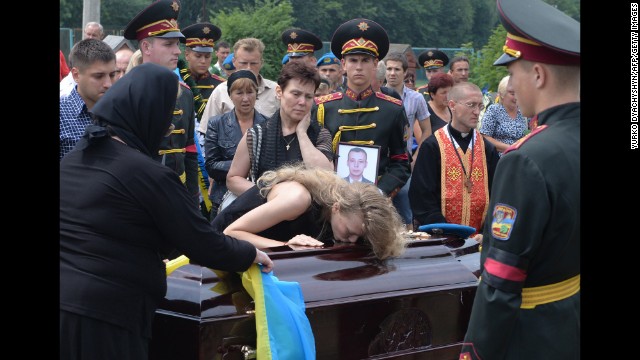 Relatives of Ukrainian military member Kyril Andrienko, who died in combat in eastern Ukraine, gather during his funeral in Lviv, Ukraine, on August 7.
Relatives of Ukrainian military member Kyril Andrienko, who died in combat in eastern Ukraine, gather during his funeral in Lviv, Ukraine, on August 7. 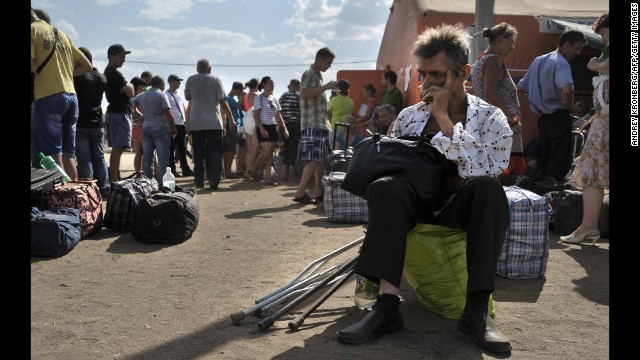 Refugees from southeastern Ukraine wait at a refugee camp in Donetsk on Wednesday, August 6.
Refugees from southeastern Ukraine wait at a refugee camp in Donetsk on Wednesday, August 6. 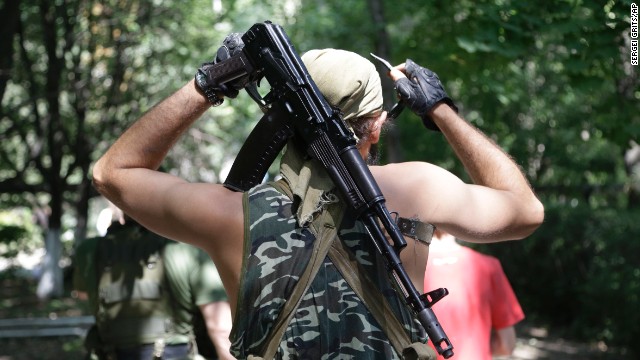 A pro-Russian rebel adjusts his weapon in Donetsk on August 6.
A pro-Russian rebel adjusts his weapon in Donetsk on August 6.  Men walk past a bomb crater in Donetsk on August 6.
Men walk past a bomb crater in Donetsk on August 6.  A man steps out of his car as Ukrainian soldiers inspect the vehicle at a checkpoint in Debaltseve on August 6.
A man steps out of his car as Ukrainian soldiers inspect the vehicle at a checkpoint in Debaltseve on August 6. 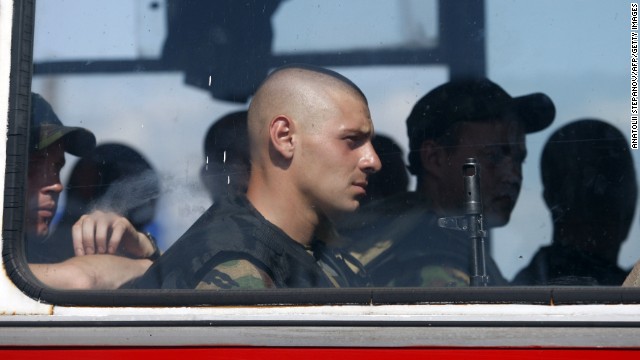 Ukrainian servicemen sit on a bus near Slovyansk, Ukraine, on Tuesday, August 5.
Ukrainian servicemen sit on a bus near Slovyansk, Ukraine, on Tuesday, August 5.  A pro-Russian separatist guards a road as Australian, Malaysian and Dutch investigators prepare to examine the crash site of Malaysia Airlines Flight 17 near the village of Rossipne, Ukraine, on August 5. U.S. and Ukrainian officials allege that a Russian-made missile shot down the plane from rebel-held territory, killing all 298 people on board. Russia and the rebel fighters deny involvement.
A pro-Russian separatist guards a road as Australian, Malaysian and Dutch investigators prepare to examine the crash site of Malaysia Airlines Flight 17 near the village of Rossipne, Ukraine, on August 5. U.S. and Ukrainian officials allege that a Russian-made missile shot down the plane from rebel-held territory, killing all 298 people on board. Russia and the rebel fighters deny involvement. 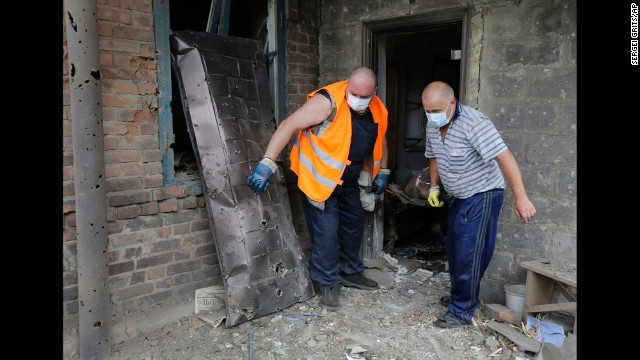 Rescue workers carry the body of a woman who was killed during a bomb shelling in Donetsk on August 5.
Rescue workers carry the body of a woman who was killed during a bomb shelling in Donetsk on August 5. 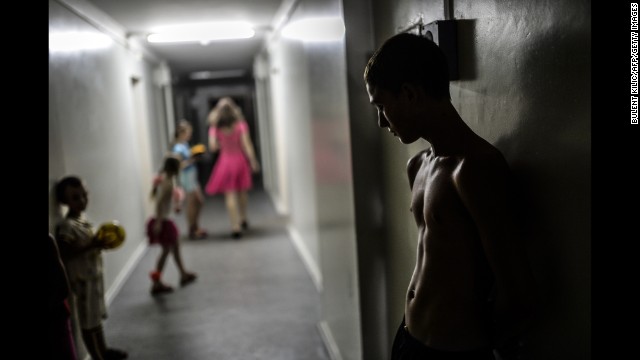 A boy stands in a hallway of a refugee hostel run by pro-Russian rebels in Donetsk on Monday, August 4.
A boy stands in a hallway of a refugee hostel run by pro-Russian rebels in Donetsk on Monday, August 4. 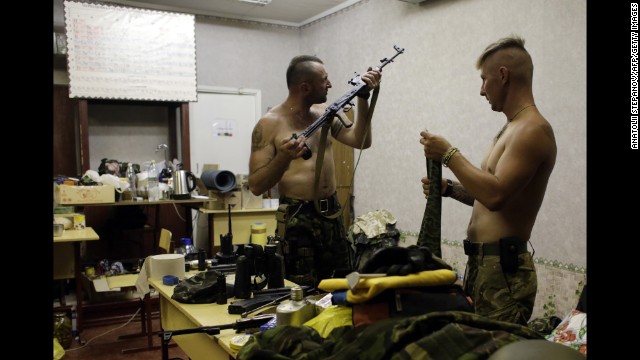 Ukrainian servicemen from the Donbass volunteer battalion clean their guns Sunday, August 3, in Popasna, Ukraine.
Ukrainian servicemen from the Donbass volunteer battalion clean their guns Sunday, August 3, in Popasna, Ukraine. 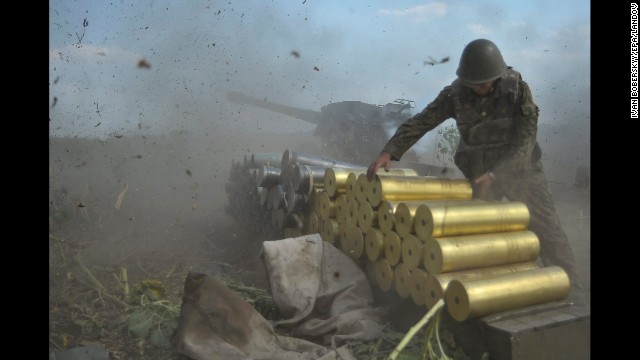 Ukrainian soldiers fire shells toward rebel positions near Pervomaysk, Ukraine, on Saturday, August 2.
Ukrainian soldiers fire shells toward rebel positions near Pervomaysk, Ukraine, on Saturday, August 2. 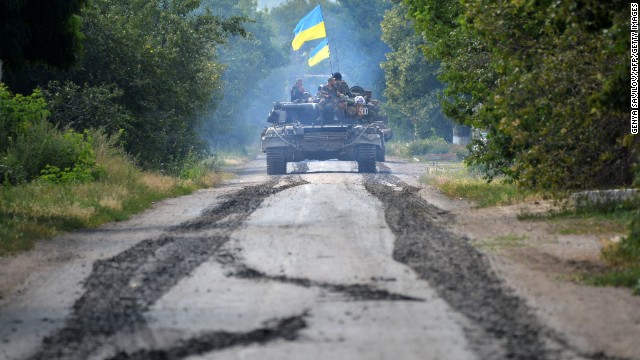 Ukrainian troops patrol near the village of Novoselovka on Thursday, July 31.
Ukrainian troops patrol near the village of Novoselovka on Thursday, July 31. 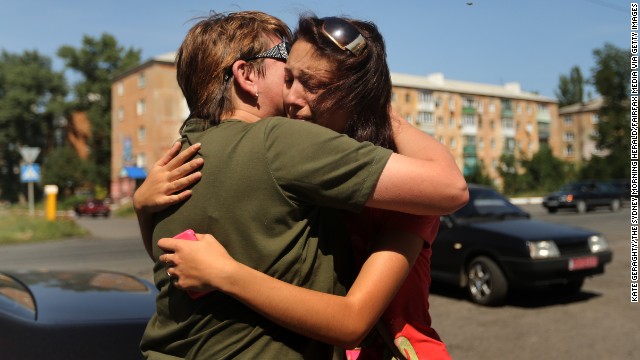 A woman says goodbye to her mother as she flees her home in Shakhtersk, Ukraine, on Tuesday, July 29. See more photos of the crisis from earlier this year
A woman says goodbye to her mother as she flees her home in Shakhtersk, Ukraine, on Tuesday, July 29. See more photos of the crisis from earlier this year  Photos: Crisis in Ukraine
Photos: Crisis in Ukraine  Kiev: Russian convoy an 'invasion'
Kiev: Russian convoy an 'invasion'  Ukrainian military tries to retake Donetsk
Ukrainian military tries to retake Donetsk All the vehicles were supposed to be monitored by members of the International Committee of the Red Cross. However, the Red Cross said it wasn't accompanying them due to the "volatile security situation" -- a reference to continued fighting between pro-Russia rebels and Ukrainian forces.
Russia's Foreign Ministry said it was satisfied that its humanitarian convoy had delivered supplies to its destination. Moscow intended to "continue to cooperate with the ICRC" in aid efforts in eastern Ukraine, its statement said.
However, Ukraine's National Security and Defense Council gave a rather different assessment.
It said Saturday that preliminary information indicated that many of the empty trucks were filled up with military equipment from arms factories that are now in rebel hands. Those weapons were then carried back over the border.
Russia's defense industry has relied heavily since Soviet times on the arms factories in eastern Ukraine.
Ukraine has repeatedly accused Russia of directly and indirectly bolstering the rebel movement in the Donetsk and Luhansk regions, allegations Moscow denies.
In a statement Saturday, OSCE chairman Didier Burkhalter deplored the failure to deliver the aid according to the agreements made between Russia and Ukraine.
Appealing to all sides to cooperate in helping civilians impacted by the fighting in Luhansk and Donetsk, he urged them "to exercise maximum restraint and refrain from any actions which could contribute to the further escalation of the situation."
But violence erupted Saturday night when shelling in Donetsk left three people dead and three others injured, according to the Donetsk mayor's office. Journalists on the scene said one of the three was a child. Bystanders claimed all were members of one family.
Merkel: Can't rule out more sanctions
Amid the furor, German Chancellor Angela Merkel met in Kiev on Saturday with Ukrainian President Petro Poroshenko.
At a joint news conference, Merkel said she could not rule out further sanctions against Russia if no progress is made in resolving the situation in eastern Ukraine.
Germany and the European Union would continue pursue a diplomatic solution in talks with Russia and Ukraine over the crisis, she said.
But, she said, Ukraine's territorial integrity is essential and its border must be secured. "We need a peaceful situation but there's no use if there's an open border with Russia over which arms are coming," she said.
Poroshenko said the Russian convoy had "violated every international law," but that confrontation had been avoided thanks to Ukraine's efforts.
He accused foreign mercenaries of bringing war to Ukraine and said they did not have the support of the people of eastern Ukraine.
"Now the time has come for peace," he said. "Our government, together with our European partners, will be doing everything for that to happen, but not at the price of Ukrainian territorial integrity."
He said he was committed to constitutional reforms and decentralization of power aimed at meeting the concerns of the Russian-speaking population in eastern Ukraine.
Merkel said millions of dollars in international aid for the region would help rebuild infrastructure and homes damaged in the conflict.
The Ukrainian President is due to meet with Russian President Vladimir Putin and EU representatives on Tuesday in Minsk, Belarus, for talks.
U.S. Vice President Joe Biden and Poroshenko spoke in a call, the White House said in a statement.
Poroshenko told Biden that "most of the Russian military trucks that had unlawfully entered Ukraine the previous day had returned to Russia" and "expressed concern about continued Russian military activity, including the firing of artillery directly into the Ukrainian town of Novoazovsk."
Biden praised "Ukraine's restraint in the face of Russia's blatant provocation and disregard of Ukraine's sovereignty." He cited Russia's "continued isolation in the U.N. Security Council, and pledged that the United States would continue working with its G-7 partners to respond to Russia's destabilizing actions in Ukraine."
Donetsk: Photos of a besieged city draining of life
NATO: 'So-called humanitarian convoy'
The Kiev-based government and its allies -- including the NATO alliance -- roundly condemned Russia's actions on Friday.
NATO Secretary General Anders Fogh Rasmussen warned that the "so-called humanitarian convoy ... can only deepen the crisis in the region, which Russia itself has created and has continued to fuel."
 Donetsk residents flee Ukrainian chaos
Donetsk residents flee Ukrainian chaos "The disregard of international humanitarian principles raises further questions about whether the true purpose of the aid convoy is to support civilians or to resupply armed separatists," Rasmussen said in a statement.
"We call this a direct invasion for the first time under cynical cover of the Red Cross," said Valentyn Nalyvaychenko, the head of Ukraine's security service.
The UK ambassador to the United Nations, Mark Lyall Grant, said that Russia had no support at a U.N. Security Council meeting Friday on the topic.
"It is an undeniable and blatant violation of Ukrainian sovereignty and clear breach of international law and the U.N. charter," Lyall Grant told reporters. "It has nothing to do with humanitarianism."
However, Putin pointed the finger at Ukraine. He expressed "serious concern" in a phone call with Merkel about endangered civilians from Ukraine's "continued (military) escalation," according to the Kremlin.
He further criticized what he characterized as "Kiev's blatant attempts to hinder the delivery of Russian humanitarian aid" into southeastern Ukraine. "Further delay would have been unacceptable," a Kremlin statement said.
'Humanitarian' aid or 'direct invasion'?
Russian troops
Lithuania condemned Friday the killing of its honorary consul in the city of Luhansk, who Lithuanian Foreign Minister Linas Linkevicius said had been "kidnapped and brutally killed by terrorists."
The OSCE also called for the killers of Mykola Zelenec to be brought to justice and said his murder demonstrates the urgent need to stop the violent escalation in eastern Ukraine.
There's also growing international concern over the apparent massing of Russian troops at the border with Ukraine.
There were up to 18,000 such "combat-ready" troops on Friday, a significant increase from previous public estimates by the Pentagon, according to a U.S. defense official with direct access to the latest information.
A second U.S. official said the United States has believed for weeks that some Russian troops have crossed the border as part of the convoys of military gear and weapons moving from Russia into Ukraine.
Of particular concern is the apparent transport of long-range and advanced missile systems and a number of pieces of longer-range artillery.
The fear is that any advance of any kind could make the ongoing fighting -- sparked last year by a political crisis over whether Ukraine would seek closer ties with Europe or Russia -- even worse.
U.N. officials estimate that more than 2,000 people have died and nearly 5,000 have been wounded in eastern Ukraine since mid-April.
UEFA sanction Russia over Crimea
Journalist Victoria Butenko reported from Kiev and CNN's Laura Smith-Spark wrote and reported in London. CNN's Diana Magnay, Greg Botelho, Christabelle Fombu and Radina Gigova contributed to this report.